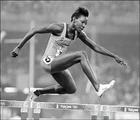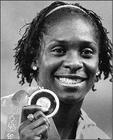

File
LEFT: Jamaica's Melaine Walker competes in the women's 400-metre hurdles final during the athletics competitions in the National Stadium at the Beijing 2008 Olympics in Beijing. Walker won the gold medal.
Photo by Charles Pitt
RIGHT: Kerron Stewart with her silver medal won in the women's 200m final in Beijing, China.
Gareth Manning, Sunday Gleaner Writer
A GOLDEN performance by Jamaica's athletes at the Games of the 29th Olympiad in Beijing, China, has resurrected an old discussion at home: how should schools manage students with extraordinary sporting talent but poor academic performance?
The issue has educators divided, with some calling for more national support to help students who bring sporting glory to their schools, but are slipping through the academic system.
Other educators are critical of the Inter-Secondary Sports Association (ISSA) requirement that disallows athletes from participating in school-based sporting competitions if they have a below 45 per cent average academic performance.
National programme
Jamaica Teachers' Association (JTA) president, Doran Dixon, argues that while there are schools with strong alumni that ensure their athletes are well supported in both sports and academics, there needs to be a programme at the national level to provide all schools with a holistic programme.
"In this globalised environ-ment, you have to recognise there is more to life than sports," says Dixon, pointing to a recent situation where several young athletes were denied scholarships to attend college in the United States because of their poor academic performances.
"Ultimately, there will have to be a discussion among stake-holders in the education system on how to facilitate these youngsters," says Dixon.
"Sport is one of those things that can aid national development ... and we have to work out a way to harness and maximise their full potential."
Retired principal of St Jago High School, Keith Noel, while not opposed to the need for discussions at the national level, seems to be on the other side of the stands.
Right support needed
The St Catherine-based school has been a powerhouse in both academia and sports, producing Olympians like Melaine Walker and Kerron Stewart, who between them won gold, silver and bronze at the Beijing Olympics.
Noel argues there is little merit to arguments that students who do well in sports do not perform well academically, noting that their talents often open them to academic opportunities if the right support is given.
"The people who you help when they take CXC (Caribbean Examination Council) exams and they get only one or no subjects, you still can get them into a junior college in America, and check eight years later they graduate from college," Noel reasoned.
Criticism
Noel criticises ISSA's insistence for students to maintain a 45 per cent average or above in their studies, as pre-requisite to participate in school sporting activities.
"A child at CXC level getting 45 per cent in four subjects has a good chance of passing four subjects," argued Noel. "But a child who is not likely to pass four subjects should not be allowed to represent his school. That, I think, is a travesty against kids who have the (athletic) talent but are weak academically."
While he encourages schools to work within the rules laid down by ISSA, he believes students involved in sports should not be penalised because they are not high academic achievers.
"You try to encourage and work with them because you know when they do well at sports you can get them into some programme where they can develop academically to get qualification and develop their sporting ability," Noel said.
Former president of the Association of Principals and Vice-Principals, Nadine Molloy, says while the school should provide encouragement and support for talented youngsters, "the primary purpose of the school is to educate the child".
Educating children
"Remember that sports is not something we can fund even through regular channels in our schools. If I take one cent from the school and mistakenly put it into a sport activity, an audit report is going to instruct me to refund it or censor me for doing so," she told The Sunday Gleaner.
Molloy, principal of Buff Bay High School, said that while schools should do what they can to support talented students who underperform, there are also challenges in giving that support.
"We are talking about changing a mindset and the value that we place on true education, because there are lots of students who feel they are star athletes and are not really here to do the class thing," she said.
Molloy believes the bigger issue is not to develop a principle on how to manage talented students within the school system, but how to educate all students.
gareth.manning@gleanerjm.com

